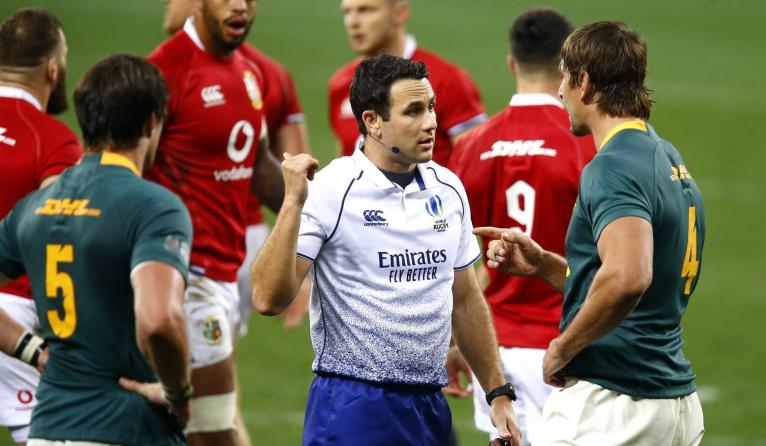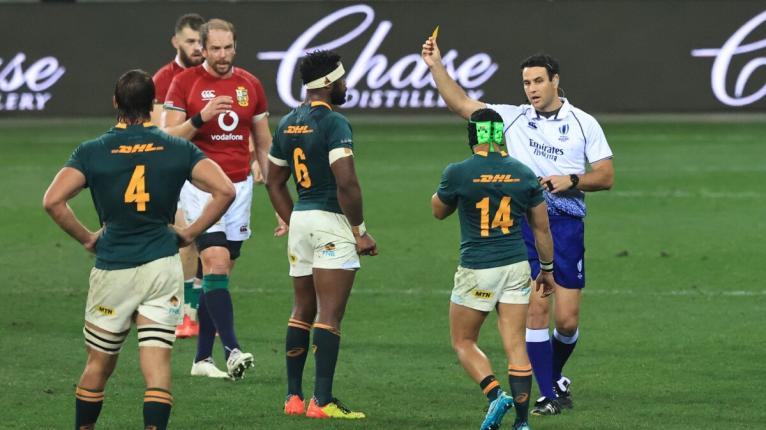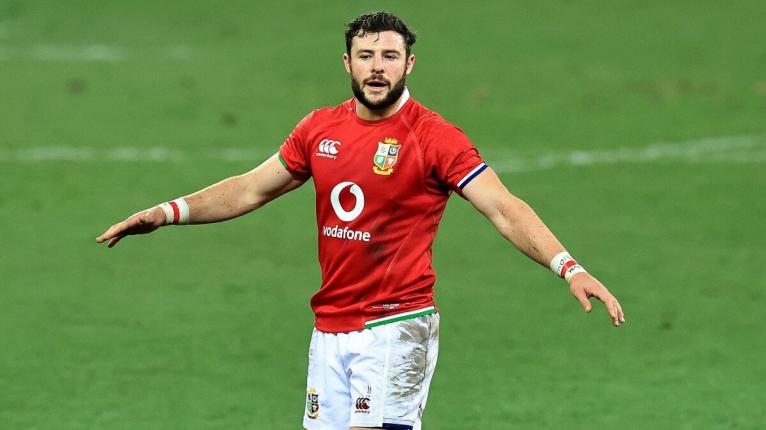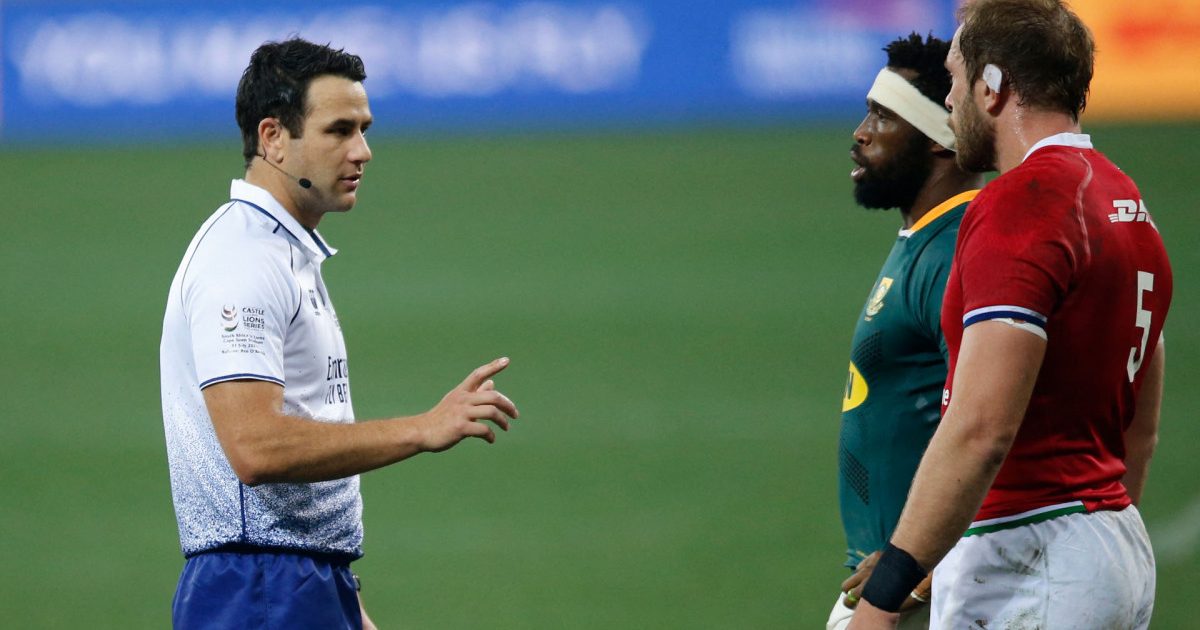Ref Watch: Am grounding, fortunate Kolbe and why Jaco Johan can take a week off

After undergoing several days of forensic analysis, ordeal by Twitter, accusation and counter-accusation rarely can any set of match officials have entered a test match under more pressure.
It will therefore be extremely gratifying for them to look back on a really solid performance – which now needs replicating when Mathieu Raynal moves from the touchline to being the man in the middle of next week’s series decider.
The post-match litmus test applied by officials at every level asks whether the better team won regardless of their decision making, and few surely would query South Africa’s deserved success.
In commentary Sam Warburton noted that penalties are usually conceded by sides who are under pressure, and as the table below shows, in this respect one team clearly dominated the second half.
| Quarter 1 | Quarter 2 | Quarter 3 | Quarter 4 | |
| Pens against SA | 5 | 4 | 1 | 0 |
| Pens against BIL | 3 | 3 | 2 | 7 |
The calmest man in Cape Town
This was a game played right on the edge, and at times beyond it, so it was no surprise that man-in-the-van Marius Jonker was regularly called into action during a 62-minute first half.
It was therefore hard to disagree with TV pundit Ronan O’Gara’s half-time prediction that the tinder box would explode and a red card would be seen at some point in the second period.
But much more rugby was played after the break and while the game never totally lost its abrasive undercurrent, as time passed it also seemed far less likely to erupt.
This change in temperature was in no small part due to referee Ben O’Keefe’s outstanding communication and game management skills.
From the outset his decision making was well thought through and clearly explained.
It was also very noticeable from a management perspective how quickly he transferred responsibility to the captains. As early as the second minute Alun Wyn Jones and Siya Kolisi were advised to speak to their players following a scuffle and left in no doubt that penalties and cards would follow any repetition.
After last week’s scruffy performance from Nic Berry, O’Keefe set out with the clear intention of stamping his authority on the match from the outset.
Game on 🔥 pic.twitter.com/5I8VYTBtjU
— RugbyPass (@RugbyPass) July 31, 2021
Hence he made no attempt to play advantage when Mako Vunipola was on the wrong side in the first minute, when the Lions were offside in midfield two minutes later or at the first scrum when he opted for a free kick when a reset would have more usually followed.
As a consequence, while there were a few talking points later in the game, you never felt control of the contest got away from him. Maybe Jaco Johan can take a few days off…
Yellow Cards
It is perhaps indicative of the changed nature of rugby union that the first two yellow cards of the series were both shown to wingers.
Scotland’s Duane van der Merwe went to the sin-bin first for a trip and he was joined on the sidelines two minutes later by his opposite number Cheslin Kolbe who mistimed an aerial challenge on Conor Murray.

It was interesting to note that neither offence had any element of intent in it – which in days past would have been a key factor in the referee’s decision-making process.
Van der Merwe was wrong-footed and stuck out an off-balance foot with which he appeared to aim a fly-hack at a loose ball. Unfortunately, he was very late and nowhere close to his intended target. If this was a clear-cut yellow, Kolbe was much more fortunate to escape a red card for going underneath Murray’s leap and tipping the Ireland no.9 into a heavy landing.
Kolbe’s eyes never waivered from the ball in the air, but current directives insist that players should be mindful of risk at all times. In mistiming his kick chase and making contact with Murray while he was at the apex of his jump Kolbe clearly failed to satisfy this requirement.
Should Kolbe have seen red? 🟥
Credit: @SkySportsRugby | #LionsRugby #RSAvBIL pic.twitter.com/f7j8Wn1q40
— RugbyPass (@RugbyPass) August 1, 2021
Murray broke his fall with his arms – but as former World Cup final referee Nigel Owens observed in commentary this is not a factor that officials now include in the decision-making process.
Lions replacement Elliot Daly was sent off early in his England career for a very similar mistimed aerial challenge during an autumn international against Argentina. Kolbe must have come very close to also seeing red.

Second Offences?
Sky’s coverage previously highlighted two incidents which the officials chose not to penalise, one involving van der Merwe and the other Kolbe.
The Lions winger made a tackle he could have pulled out of some time after the ball had gone, while Kolbe’s upright body position in a tackle led to a clash of heads with Tom Curry.
Had either been penalised – or carded – it is interesting to speculate whether their later offences would have seen tougher sanctions applied on a ‘totting-up’ principle.
TMO Grounding Decisions
The Lions went closest to scoring five minutes before the break when Robbie Henshaw recovered Dan Biggar’s chip before being wrapped up and subsequently losing the ball to a superb piece of Kolisi defence.
It is extremely difficult to prevent a rugby ball being grounded with one hand – due to its shape and length. Despite this, O’Keefe’s onfield call meant the TMO was required to find conclusive evidence that ball and ground came in contact and from the angles shown to British and Irish viewers there was none.
Jonker’s second key moment came when Lukhanyo Am touched down Handre Pollard’s delicate kick ahead to claim his country’s second try.
The TV commentary for me confused rather than simplified the long debate which followed between O’Keefe and his TMO.
Law is extremely clear that a player grounding a loose ball – usually following a kick ahead – only requires downward pressure with any part of his upper body or arms other than his head.
Only when a player is carrying the ball does the question of whether he has it under control become relevant.
The first replay made it obvious that Am had downward pressure – after which the only debate was whether his first touch knocked it forward prior to the grounding being completed. For me the correct call was made.

Anorak’s Corner
The law book contains fewer dusty corners than in times gone by, but a few technical offences remain which very few officials apply in practice.
Feeding the scrum heads this ‘blind eye’ list – I hasten to add that I find this situation as baffling as most rugby fans.
But prior to Faf De Klerk being pinged by O’Keefe, when did anyone last penalise a scrum half making a dummy run from the base of a scrum or breakdown?
The Springboks coach was happy with the deflection of attention the team received. #RSAvBIL https://t.co/EUpIyIXDvf
— RugbyPass (@RugbyPass) August 1, 2021
Maul or Tackle?
Am I alone in finding it irritating when a clearly formed maul (which only requires the ball-carrier to be in contact with one further player from each side) is belatedly called as a tackle?
Referees do this because it prevents a pile-up, requires the defenders to release and roll away and allows continuity in play. However, it is clearly not what the law-makers intend – and by interpreting this incorrectly O’Keefe almost had a material impact on this match.
Biggar’s 49th minute penalty, which struck the post, followed the hosts being penalised for not releasing the ball-carrier in a situation which (with three players from both sides in contact) was clearly a maul not a tackle.





























